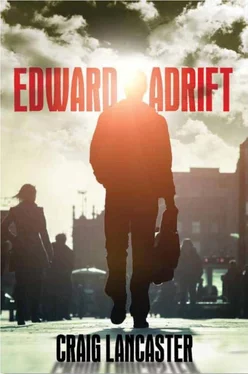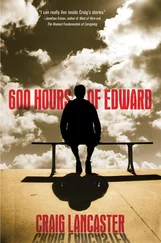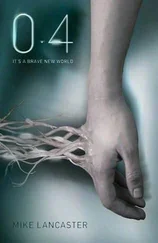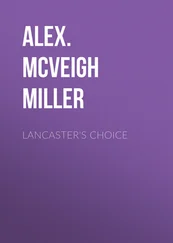“The gauge says 268,443.4,” she says as we merge onto Interstate 70 westbound.
I try to reconcile what I’m seeing now with what it looked like two days ago, when Kyle and I were driving through a blinding snowstorm in the middle of the night. It’s impossible to do.
“Here it is,” Sheila Renfro says, and she slows down so she can pull over on the shoulder of the interstate.
Broken pieces of my turn signal are on the side of the asphalt. I see them now, and I guess that’s how Sheila Renfro knew to stop here. You’re not supposed to stop here, but she doesn’t seem concerned. It’s her business if she wants to risk a traffic ticket.
“What does the mileage say?” I ask.
“Let’s see… it’s 268,449.2.”
“So that’s 5.8 miles from Limon.”
“Looks like it.”
I do the calculations in my head. “So that means I’ve driven 1,844.9 miles on this trip, not 1,846.1.”
“If you say so.”
“That’s clearly what the math indicates.”
“What difference does it make?”
This flummoxes me. “I don’t know. I like to track things.”
“Are you going to include the miles we’ve gone today in your total?”
“That’s a silly question, Sheila Renfro,” I say. “Of course I am.”
“Do you know how far we’ve gone today?”
“No, but I can look up the distance from St. Joseph Hospital to Cheyenne Wells, and I can account for this detour.”
“Can you account for the different route I took through Denver?”
I don’t like where this conversation is headed.
“You took a different route?”
“Yes. There was road construction and bad traffic, so I went a different way.”
“Which way did you go?” This situation, while not ideal, is not irretrievable (I love the word “irretrievable”). I can still use the Internet to figure out the mileage.
“I don’t remember.”
This situation has become irretrievable.
“Shit,” I say.
“It’s no big deal, Edward. Also, don’t cuss around me.”
— • —
I try to stay miffed at Sheila Renfro, but it’s not possible. I like her too much. I remember how much she has done and is doing for me, taking care of me at the hospital and now bringing me back to Cheyenne Wells so I can recuperate.
“Sheila Renfro,” I ask, “what did—”
“Why do you say that?”
“Say what?”
“Sheila Renfro. You say my first and last name every time you talk to me.”
“I don’t know.”
“It’s weird.”
“No, it isn’t.”
“It’s a little weird.”
“What do you want me to call you?”
“Just Sheila. Or you could call me ‘She-Pumpkin,’ which is what my daddy used to call me.”
“I don’t think I could call you that.”
“I know, silly. I was making a joke.”
Sheila Renfro is pretty funny sometimes.
“She-ster?” I say.
“What was that? A nickname?”
“I thought I’d try it.”
“Don’t. Nicknames should come naturally. It sounds like you’re trying.”
I’m growing flummoxed and frustrated.
“OK, can I just ask you the question I’ve been trying to ask?”
“Sure, E-Dog.”
“E-Dog?”
“Yes, that’s your nickname.”
“It sounds like you’re the one trying now.”
“I’m not trying at all. It came perfectly naturally.”
“I don’t like it.”
“OK, how about Eddie Smoochiekins?”
“E-Dog is fine, I think.”
Sheila Renfro laughs and bobs her head left and right.
She’s having a good time.
Here’s a secret: I’m having a good time, too.
— • —
We pass through the town of Kit Carson and Sheila Renfro says, “We’re close now. Twenty-five miles.”
I like the countryside here. It’s stark and hard, not the lush and mountainous beauty that one tends to associate with Colorado. In that way, it reminds me of the part of Montana I’m from.
I remember being in the eastern Montana town of Terry with my father when I was a teenager and him pointing out the buttes in the distance, which he called “badlands.” He said that whole part of Montana was homesteaded and that a lot of people couldn’t make a go of it, because the weather and the terrain were so unforgiving. He said we should admire the people who still lived there, because they had beaten the odds and the land and whittled a life into that bleak landscape. My father was big on defeating things, be they political opponents or systems or landscapes. It was all a competition for him.
I haven’t read up on the history of homesteading in this part of Colorado, but I bet that the people who have made this area home would draw my father’s admiration for their tenacity (I love the word “tenacity”). Maybe that’s why he enjoyed working here. Maybe that’s why he’s been in my dreams, urging me to come here.
I must be careful. That’s a lot of maybes and projections, and those are unreliable things, as I know all too well.
— • —
Sheila Renfro slows down and eases her Suburban to the shoulder of the road. We’re on a flat, straight stretch of the highway, with fallow farmland on both sides of us.
“How are you feeling, E-Dog?” she says. “Can you get up and walk a little bit?”
“Here?”
“I want to show you something.”
“OK, S-Money.”
“Another nickname?”
“Yes.”
“I like that one.”
I put my hands on the bench seat and push myself to the full sitting position while Sheila Renfro gets out of the Suburban and walks to the other side to let me out. My ribs ache, but it’s not the screaming pain I’ve come to expect. With the door now open, I scrunch along on the seat until my feet are nearly out the door.
“Do you need some help?” she asks.
“No, I think I have it.”
Slowly, I reach for the pavement with my toes, until at last they find it. I grab the door frame with my hands and push myself to my feet. Again, the pain is slight rather than overwhelming.
“You did great, E-Dog!” she says.
“Thank you, S-Money.”
Sheila Renfro laughs and so do I.
“Follow me,” she says.
She leads me behind the Suburban, and then she looks both ways on the two-lane highway to ensure it’s safe to cross. There’s nobody out here.
We walk across the road to a grassy area on the other side. Sheila Renfro points to a spot about ten feet off the road.
“My daddy and my mom died right there.” Again, she says this matter-of-factly, as if she’s passing along esoterica (I love the word “esoterica”) rather than something deeply personal and painful. Dr. Buckley calls this “compartmentalization.” Dr. Buckley often told me that people develop strategies for keeping themselves from being harmed by others. Compartmentalizing pain helps with this. Compartmentalization was a difficult concept for me to master. I’m not good at developing strategies for pain. If something hurts me, I’m hurt, and I don’t hide it well. I hope Sheila Renfro knows that I don’t wish to hurt her.
“I drive by here all the time,” she says. “Unless I want to go to Kansas, it’s the only route that leads anywhere I want to go. Every time I pass by, I think ‘Bam. They’re dead.’ People tell you life is short. They have no idea.”
I finally understand how deep Sheila Renfro’s loss is. As I think about it now, I realize that in the three years, one month, and eighteen days that my father has been dead, I have never driven past the golf course where he had his heart attack. I don’t think I have consciously thought “I can’t go by there,” but I have avoided it just the same. Before I left on this trip, when I was coming home from Rimrock Mall (after getting my bitchin’ iPhone) and taking a circuitous (I love the word “circuitous”) route home to avoid left turns, I went all the way to Shiloh Road instead of Zimmerman Trail, because Zimmerman Trail runs right by the parking lot where my father was stricken.
Читать дальше












![Edward Ellis - Adrift on the Pacific - A Boys [sic] Story of the Sea and its Perils](/books/753342/edward-ellis-adrift-on-the-pacific-a-boys-sic-s-thumb.webp)